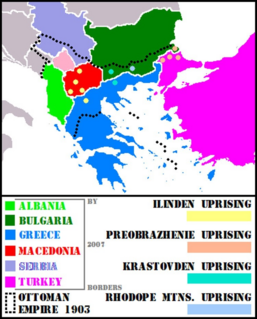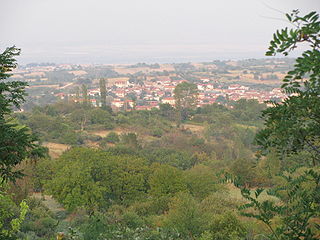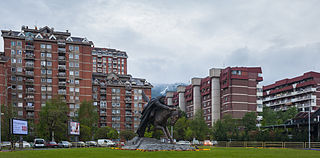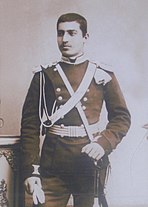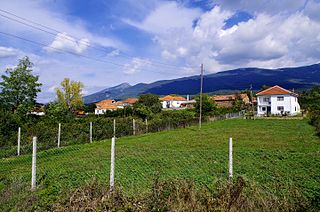| Barakovo Бараково | |
|---|---|
| Village | |
 | |
| Coordinates: 42°4′1″N23°4′1″E / 42.06694°N 23.06694°E | |
| Country | |
| Province | Kyustendil Province |
| Municipality | Kocherinovo |
| Area | |
| • Total | 7.979 km2 (3.081 sq mi) |
| Elevation | 384 m (1,260 ft) |
| Population (2013) [1] | |
| • Total | 468 |
| Time zone | EET (UTC+2) |
| • Summer (DST) | EEST (UTC+3) |
Barakovo (Bulgarian : Бараково) is a village in Kocherinovo Municipality, Kyustendil Province of southwest Bulgaria. As of 2013, it had a population of 468. [1] It is situated at the western foothills of the Rila Mountains on the banks of the Rilska River. Between 1974 and 1991 it was administratively a neighbourhood of the town of Kocherinovo. [2]

Bulgarian, is an Indo-European language and a member of the Southern branch of the Slavic language family.

Kocherinovo Municipality is a municipality in Kyustendil Province, Bulgaria. The administrative centre is Kocherinovo.

Kyustendil Province is a province in southwestern Bulgaria, extending over an area of 3084.3 km², and with a population of 163,889. It borders on the provinces of Sofia, Pernik, and Blagoevgrad; to the west, its limits coincide with the state borders between Bulgaria and North Macedonia, and between Bulgaria and the Republic of Serbia. The administrative center of the Province is Kyustendil.
After the Liberation of Bulgaria in 1878 the village remained within the Ottoman Empire on the very border with the Principality of Bulgaria. The population supported the Bulgarian Internal Macedonian Revolutionary Organization. At the outbreak of the First Balkan War in 1912 seven people from Barakovo joined the Macedonian-Adrianopolitan Volunteer Corps that was formed in support the Bulgarian war effort against the Ottomans. [3]

In Bulgarian historiography, the liberation of Bulgaria refers to those events of the Russo-Turkish War (1877–1878) that led to the re-establishment of the Bulgarian state under the Treaty of San Stefano of 3 March 1878.

The Ottoman Empire, also historically known in Western Europe as the Turkish Empire or simply Turkey, was a state that controlled much of Southeast Europe, Western Asia and North Africa between the 14th and early 20th centuries. It was founded at the end of the 13th century in northwestern Anatolia in the town of Söğüt by the Oghuz Turkish tribal leader Osman I. After 1354, the Ottomans crossed into Europe, and with the conquest of the Balkans, the Ottoman beylik was transformed into a transcontinental empire. The Ottomans ended the Byzantine Empire with the 1453 conquest of Constantinople by Mehmed the Conqueror.

The Principality of Bulgaria was a de facto independent, and de jure vassal state under the suzerainty of the Ottoman Empire. It was established by the Treaty of Berlin in 1878.
In 1903 the entrepreneur Todor Balabanov founded a timber factory in the village that after the liberation of Barakovo in 1912 employed between 500 and 1000 people. The factory grew to have its own power station, clinic, school, cinema and casino. In the 1930s the prominent Bulgarian poet Nikola Vaptsarov worked there.

Nikola Yonkov Vaptsarov was a Bulgarian poet, communist and revolutionary. Working most of his life as a machinist, he only wrote in his spare time. Despite the fact that he only ever published one poetry book, he is considered one of the most important Bulgarian poets. Because of his underground communist activity against the government of Boris III and the German troops in Bulgaria, Vaptsarov was arrested, tried, sentenced and executed the same night by a firing squad.

